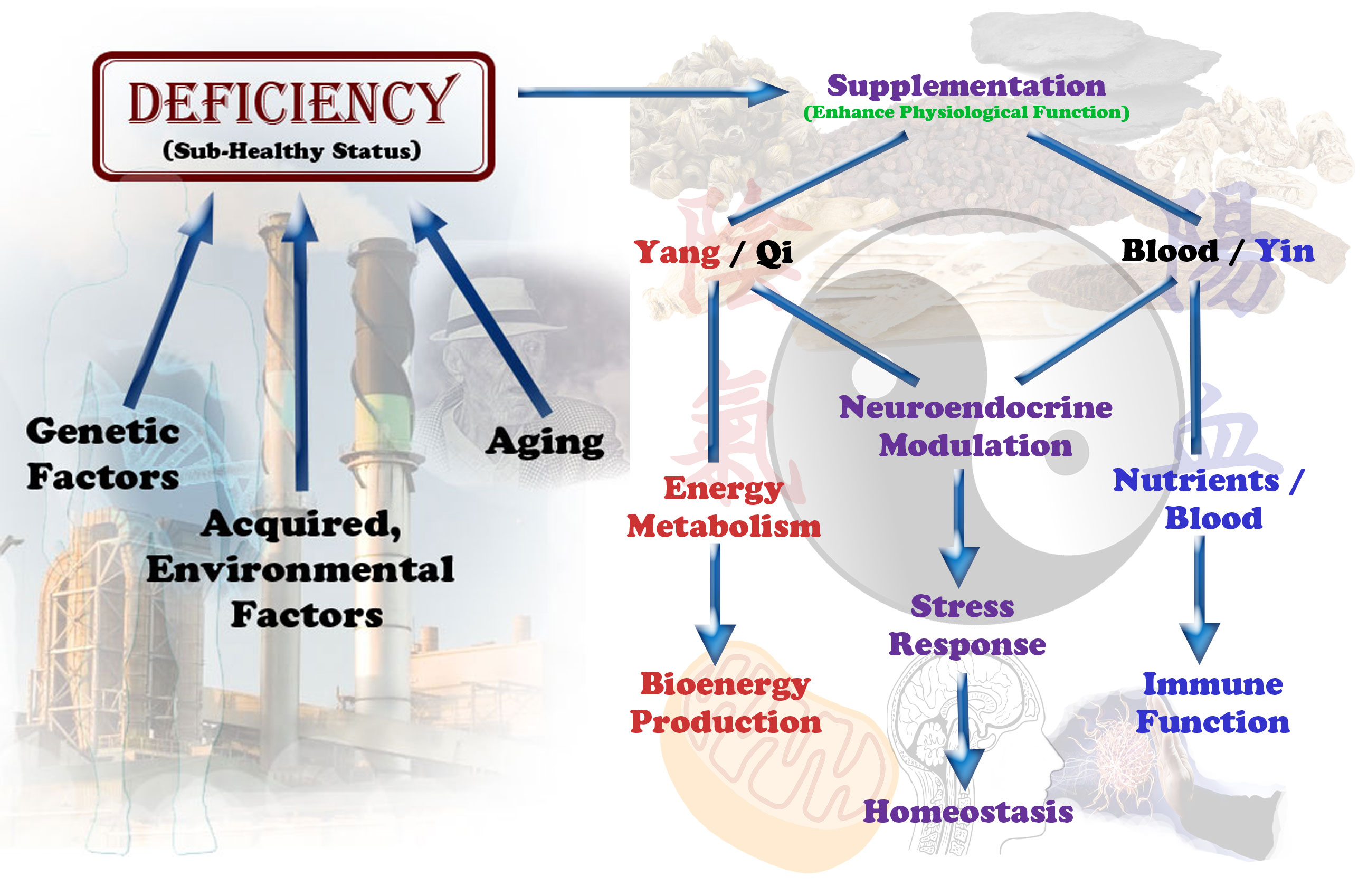 According to Chinese Medicine theory, a “Deficiency” in body function (ie. a sub-healthy status) can be caused by genetic factors and/or acquired environmental factors as well as aging. To remediate declining physiological function, one possible approach is supplementation with Chinese tonifying herbs with various functional properties, depending on the particular pattern of deficiency in body function involved. In essence, Yang/Qi-invigorating tonifying herbs, which are used for individuals with Yang/Qi deficiency, can up-regulate energy metabolism, with a resultant increase in bioenergy production. Alternatively, Yin-nourishing/Blood-enriching tonifying herbs are used for fortifying nutrient supply as well as blood production in the body, with an associated stimulation of immune function. In addition to Yang and Yin-related functions, Qi and Blood tonifying herbs also participate in modulating neuroendocrine function and eliciting stress responses in the body in order to achieve and maintain optimal homeostasis.
According to Chinese Medicine theory, a “Deficiency” in body function (ie. a sub-healthy status) can be caused by genetic factors and/or acquired environmental factors as well as aging. To remediate declining physiological function, one possible approach is supplementation with Chinese tonifying herbs with various functional properties, depending on the particular pattern of deficiency in body function involved. In essence, Yang/Qi-invigorating tonifying herbs, which are used for individuals with Yang/Qi deficiency, can up-regulate energy metabolism, with a resultant increase in bioenergy production. Alternatively, Yin-nourishing/Blood-enriching tonifying herbs are used for fortifying nutrient supply as well as blood production in the body, with an associated stimulation of immune function. In addition to Yang and Yin-related functions, Qi and Blood tonifying herbs also participate in modulating neuroendocrine function and eliciting stress responses in the body in order to achieve and maintain optimal homeostasis.
Our research works aim to define the pharmacological basis of health-promoting actions of Chinese tonifying herbs, with emphases on the regulation of glutathione antioxidant system and immuno-modulatory action. We have been able to elucidate the biochemical mechanism involved in the generalized tissue protection afforded by schisandrin B – the most abundant active component in Schisandra Fructus . We thus establish the biochemical basis of the purported ‘Qi-invigorating’ action of Schisandra Fructus in major organs, which involve the enhancement of mitochondrial glutathione antioxidant status and functional ability (bioenergy production), as well as the induction of heat shock proteins (stress response).
Recent studies have shown that while ‘Yang-invigorating’ Chinese tonifying herbs can invariably increase mitochondrial ATP generation capacity, ‘Yin-nourishing’ tonifying herbs produce immuno-stimulatory activity. On-going researches include: (1) the investigation of molecular mechanism(s) underlying the stimulation of mitochondrial activity by ‘Yang/Qi-invigorating’ tonifying herbs; (2) the investigation of ursolic acid (a ‘Yang-invigorating’ active component from Cynomorii Herba) on metabolic syndrome including fatty liver; and (3) the investigation of anti-osteoporotic components from ‘Yang-invigorating’ tonifying herbs. As a ‘proof of principle” endeavor, we have developed evidenced-based Chinese herbal health/skincare products by translating a number of research outcomes into marketable entities.
